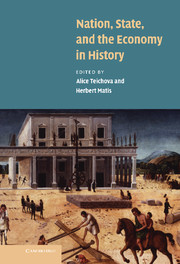Book contents
- Frontmatter
- Contents
- List of figures
- List of tables
- List of contributors
- Acknowledgements
- Introduction
- PART I
- PART II
- PART III
- PART IV
- PART V
- 18 The state and economic growth in Latin America: Brazil and Mexico, nineteenth and early twentieth centuries
- 19 Building the Brazilian nation-state: from colony to globalisation
- 20 The role of nationhood in the economic development of the USA
- 21 Economic policy and Australian state building: from labourist-protectionism to globalisation
- Index
21 - Economic policy and Australian state building: from labourist-protectionism to globalisation
Published online by Cambridge University Press: 07 September 2009
- Frontmatter
- Contents
- List of figures
- List of tables
- List of contributors
- Acknowledgements
- Introduction
- PART I
- PART II
- PART III
- PART IV
- PART V
- 18 The state and economic growth in Latin America: Brazil and Mexico, nineteenth and early twentieth centuries
- 19 Building the Brazilian nation-state: from colony to globalisation
- 20 The role of nationhood in the economic development of the USA
- 21 Economic policy and Australian state building: from labourist-protectionism to globalisation
- Index
Summary
ORIGINS AND COMPARATIVE SIGNIFICANCE OF THE EMERGING AUSTRALIAN STATE
The emergence and development of the Australian state and economy from the initial precarious penal colonisation of New South Wales (NSW) in 1788 must be understood within the context of British imperialism and the world economy of the nineteenth century. The early economic development depended to a large degree upon state direction of investment, labour and land use. Early political/administrative struggles concerned the control and alienation of land, access to foreign currency in order to import luxuries and control of the convict labour supply. The lands of Aboriginal inhabitants were simply expropriated by the crown under the legal fiction of terra nullius. A free, proto-capitalist economy soon burgeoned within the imperial framework, especially after a couple of decades of uncertainty. Unlike almost all other parts of what became the industrialised world of the early to mid-twentieth century, and in comparison with other former settler colonies in the Americas, Australia was founded within and was an integral part of the world economy from the very beginning. The Australian colonies and later the independent federated Australian Commonwealth owed their existence, their character and their development to these overlapping forces. There was no other background or significant pole of attraction or alternative developmental trajectory possible. Australia was born as a modern component or offshoot of the British state and developed in such a way that no pre-capitalist or anti-modern forces were permitted to influence significantly the infant society.
- Type
- Chapter
- Information
- Nation, State and the Economy in History , pp. 404 - 423Publisher: Cambridge University PressPrint publication year: 2003
- 5
- Cited by



